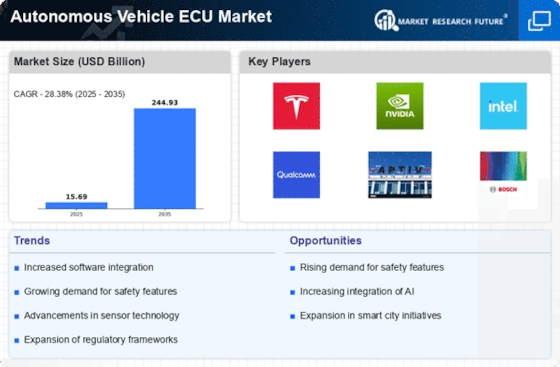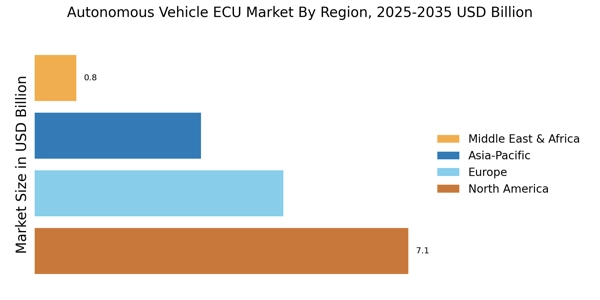Technological Innovations in Autonomous Vehicle ECU Market
The Autonomous Vehicle ECU Market is experiencing a surge in technological innovations, particularly in the realm of artificial intelligence and machine learning. These advancements enable vehicles to process vast amounts of data in real-time, enhancing decision-making capabilities. For instance, the integration of advanced sensors and communication systems allows for improved vehicle-to-vehicle and vehicle-to-infrastructure interactions. As a result, the market is projected to grow at a compound annual growth rate of approximately 20% over the next five years. This growth is driven by the increasing demand for enhanced safety features and autonomous driving capabilities, which are becoming essential in modern vehicle design.
Regulatory Frameworks Supporting Autonomous Vehicle ECU Market
The Autonomous Vehicle ECU Market is significantly influenced by evolving regulatory frameworks that promote the adoption of autonomous vehicles. Governments are increasingly recognizing the potential benefits of autonomous technology, including reduced traffic accidents and improved traffic flow. As a result, many countries are implementing supportive regulations that facilitate testing and deployment of autonomous vehicles. For example, certain regions have established pilot programs to assess the safety and efficacy of autonomous systems. This regulatory support is expected to bolster market growth, with estimates suggesting that the market could reach a valuation of over 50 billion dollars by 2030.
Investment in Research and Development for Autonomous Vehicle ECU Market
Investment in research and development is a crucial driver for the Autonomous Vehicle ECU Market. As competition intensifies among automotive manufacturers and technology companies, there is a concerted effort to innovate and enhance ECU capabilities. This investment is not only focused on improving existing technologies but also on exploring new avenues such as quantum computing and edge computing, which could revolutionize data processing in autonomous vehicles. Reports indicate that R&D spending in the automotive sector is expected to exceed 100 billion dollars annually by 2027, underscoring the commitment to advancing autonomous vehicle technologies.
Consumer Preferences for Advanced Safety Features in Autonomous Vehicle ECU Market
Consumer preferences are shifting towards advanced safety features, which is a key driver for the Autonomous Vehicle ECU Market. As awareness of road safety increases, consumers are demanding vehicles equipped with cutting-edge safety technologies. Features such as automatic emergency braking, lane-keeping assistance, and adaptive cruise control are becoming standard expectations. This trend is reflected in market data, indicating that nearly 70% of consumers prioritize safety features when purchasing a vehicle. Consequently, manufacturers are investing heavily in the development of sophisticated ECUs that can support these features, thereby driving market expansion.
Collaboration Between Automotive and Technology Sectors in Autonomous Vehicle ECU Market
Collaboration between the automotive and technology sectors is emerging as a pivotal driver for the Autonomous Vehicle ECU Market. Partnerships between traditional automakers and tech companies are fostering innovation and accelerating the development of autonomous systems. These collaborations often focus on integrating software solutions with hardware components, enhancing the overall functionality of ECUs. For instance, joint ventures are being formed to develop advanced driver-assistance systems that leverage artificial intelligence. This synergy is likely to propel market growth, as it combines the strengths of both sectors to create more efficient and reliable autonomous vehicles.

















